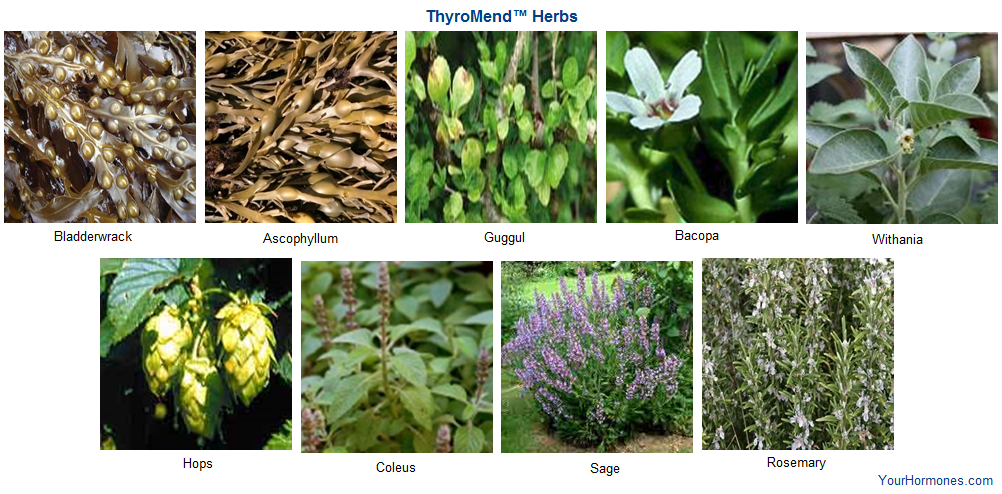
ThyroMend™ Herbs
Norwegian Sea Kelp (Ascophyllum nodosum) is a dietary source of bio-available iodine. Ascophyllum nodosum is also able to increase the activity of glutathione peroxidase, an important antioxidant. Human thyrocytes synthesize and secrete extracellular glutathione peroxidase, which translocates into the intracellular space and prevents peroxidative damage of thyrocytes from diffusion of extracellular hydrogen peroxide (H202) during stimulation of thyroid-hormone synthesis.*
Bladderwrack (Fucus vesiculosus), another dietary source of natural bio-available iodine, used by many societies throughout history, also has demonstrated anti-estrogen properties in both human and animal studies, suggesting that it may contribute protective health to estrogen sensitive tissue such as the thyroid gland.* Due to sourcing issues during covid, we have removed Bladderwrack from the seaweed blend.
Guggulsterone (Commiphora mukul) supports thyroid function through increased conversion of T4 to T3 in the liver, the principle site of T3 generation. Guggulsterone can also activate multiple receptors on the nuclear membrane, including thyroid receptors (alpha & beta), retinoic acid receptors, (which pair with thyroid receptors), and the vitamin D receptor, which all play a role in thyroid function. It also supports healthy cholesterol levels and decreases LDL oxidation; a critical concern for those with sub-optimal thyroid function.*
Rosemary (Rosmarinus officinalis) provides carnosic acid, a polyphenolic diterpene that at low concentrations increases the expression of vitamin D and retinoid receptors. Retinoid-X- receptors (RXR) couple with thyroid hormone receptors (TR) to create RXR/TR heterodimers, the principle mediators of target gene regulation by T3 hormone. Carnosic acid also affects retinoic acid receptors (RAR) to act as a TR agonist. Rosmarinic acid has antioxidant and anxiolytic properties. Carnosol has anti-inflammatory properties.*
Sage (Salvia officinalis) has long been recognized as a very rich source of the antioxidant carnosic acid, which as noted above, can increase T3 activity through improved RXR/TR heterodimerization. Salvia officinalis also has memory supportive properties, including memory retention, more efficient memory retrieval and improved mood and cognitive task performance. Sage also has a calming affect due to its ability to gently bind to the GABA/benzodiazepine receptor complex in brain tissue.*
Ashwagandha (Withania somnifera) was found to act directly on the thyroid to raise serum levels of thyroid hormones in animal studies during the late 1990s. Though inconclusive, a case review in late 2005 indicated that Ashwagandha may have the ability to raise serum levels of thyroid hormones in humans. Ashwagandha has also been attributed as having a number of adaptogenic properties including neuroprotective properties.*
Coleus (Coleus forskohlii) contains forskolin, a potent activator of the cyclic AMP-generating system in many tissues including the thyroid, and increases T3 & T4 secretion from thyrocytes in a fashion similar to TSH, though independent from TSH. Forskolin is specifically able to mimic the effect of TSH in regard to iodide uptake, organification of iodine, thyroglobulin (TG) production, and promote secretion of T3 & T4, through an increase in the expression of sodium/iodide symporter (NIS) proteins.*
Brahmi (Bacopa monniera) increased T4 serum concentrations in animal studies. Brahmi has a direct affect on the thyroid, versus an effect on hepatic conversion to T3. Brahmi can improve neurocognitive function, which is often diminished with sub-optimal thyroid function. In human studies, it improves many of the higher order cognitive processes, including speed of visual information processing, learning rate, memory consolidation, memory retention, retention of new information, and decrease the rate of forgetting newly acquired information.*
Hops (Humulus lupulus) can increase the uptake of iodide into the thyroid gland, a fundamental step in thyroid hormone synthesis, through interactions with sodium-iodide- symporter (NIS) proteins. This observation is quite the opposite of many other plant-derived phenolic secondary metabolites such as isoflavonoids, which can potentially inhibit iodide uptake. Xanthohumol, a chalcone found in Humulus lupulus, plays a critical role in supporting normal blood lipid and glucose metabolism. It can also improve mood disturbances such as restlessness and anxiety, as well as sleep disturbances.*
